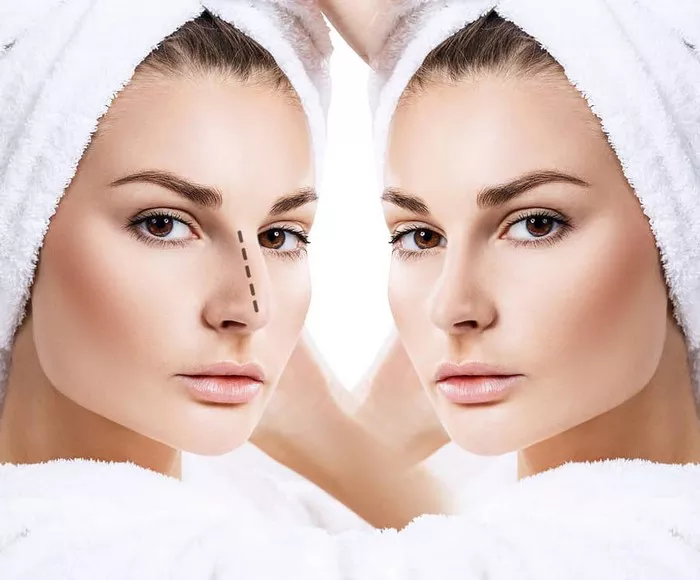Rhinoplasty, commonly known as a nose job, is a popular cosmetic surgery aimed at reshaping the nose to improve appearance or function. While most patients achieve their desired results, some may experience unexpected outcomes such as a hardening of the nose tip. Understanding the reasons behind this phenomenon is crucial for both patients and surgeons to manage expectations and optimize post-operative care.
1. Post-Surgical Swelling
Inflammation and Fluid Accumulation
After rhinoplasty, it is natural for the nose to swell as the body’s response to surgical trauma. Inflammation causes fluid to accumulate in the tissues, leading to a firm or hard feeling at the nose tip. This is usually temporary and part of the healing process.
Duration of Swelling
Swelling can persist for weeks or even months. The nose tip is particularly susceptible to prolonged swelling because it has less soft tissue and more cartilage. The hardening sensation often diminishes as the swelling subsides.
Management of Swelling
Proper post-operative care, including elevating the head, applying cold compresses, and taking prescribed medications, can help reduce swelling. Patients should follow their surgeon’s instructions diligently to ensure optimal healing.
2. Scar Tissue Formation
Normal Healing Process
Scar tissue formation is a natural part of the healing process after any surgery. In rhinoplasty, scar tissue can form around the surgical site, including the nose tip. This can make the tip feel hard or firm.
Excessive Scar Tissue
In some cases, the body produces excessive scar tissue, leading to a condition known as fibrosis. This can cause significant hardening of the nose tip and may require medical intervention.
Preventing and Treating Scar Tissue
Surgeons can minimize scar tissue formation by using refined techniques and avoiding excessive manipulation of tissues. Post-operative treatments, such as massage, steroid injections, or laser therapy, can help manage and reduce scar tissue.
See Also: 7 Reasons to Have a Secondary Rhinoplasty
3. Graft and Implant Integration
Use of Grafts and Implants
Rhinoplasty often involves the use of grafts or implants to achieve the desired shape and structure. These materials need time to integrate with the surrounding tissues, which can temporarily cause the nose tip to feel hard.
Types of Grafts and Implants
Common materials include cartilage (from the patient’s septum, ear, or rib) and synthetic implants. Each type has its own integration process and timeline, affecting the hardness and healing of the nose tip.
Monitoring and Care
Regular follow-up appointments with the surgeon are essential to monitor the integration process. Any signs of complications, such as excessive hardening or displacement, should be addressed promptly.
4. Surgical Technique and Precision
Impact of Surgical Technique
The surgical technique used during rhinoplasty can significantly influence post-operative outcomes, including the hardness of the nose tip. Precise and gentle handling of tissues can minimize trauma and reduce the risk of hardening.
Surgeon’s Experience and Skill
An experienced and skilled surgeon is more likely to achieve a smooth and natural-feeling result. Patients should choose a board-certified plastic surgeon with a proven track record in rhinoplasty.
Importance of Pre-Surgical Planning
Thorough pre-surgical planning, including detailed consultations and imaging studies, allows the surgeon to tailor the procedure to the patient’s anatomy and aesthetic goals. This can help prevent complications such as hardening of the nose tip.
5. Infection and Inflammation
Risk of Infection
Infections, although rare, can occur after rhinoplasty and lead to increased inflammation and hardness at the nose tip. Signs of infection include redness, pain, swelling, and discharge.
Preventive Measures
Surgeons take several measures to prevent infections, such as using sterile techniques, prescribing antibiotics, and providing detailed post-operative care instructions. Patients should follow these instructions carefully to minimize infection risk.
Treatment of Infection
If an infection occurs, prompt treatment with antibiotics or other interventions is necessary. Addressing the infection quickly can prevent long-term complications and reduce hardening of the nose tip.
6. Individual Healing Variations
Genetic Factors
Individual healing responses can vary widely due to genetic factors. Some patients may naturally produce more scar tissue or experience prolonged swelling, leading to a harder nose tip.
Health and Lifestyle
A patient’s overall health and lifestyle choices, such as smoking or poor nutrition, can impact healing. Healthy habits and a well-balanced diet can promote better recovery and minimize complications.
Personalized Post-Operative Care
Surgeons should provide personalized post-operative care plans tailored to each patient’s needs and healing responses. Regular check-ups and open communication can help address any concerns and ensure a smooth recovery.
Conclusion
Understanding the reasons behind the hardening of the nose tip after rhinoplasty can help patients manage their expectations and follow appropriate post-operative care. While some degree of hardness is normal during the healing process, persistent or severe hardening should be evaluated by a qualified surgeon. By choosing an experienced surgeon and adhering to recommended care guidelines, patients can achieve optimal outcomes and enjoy the benefits of their rhinoplasty procedure.
Related topics:

